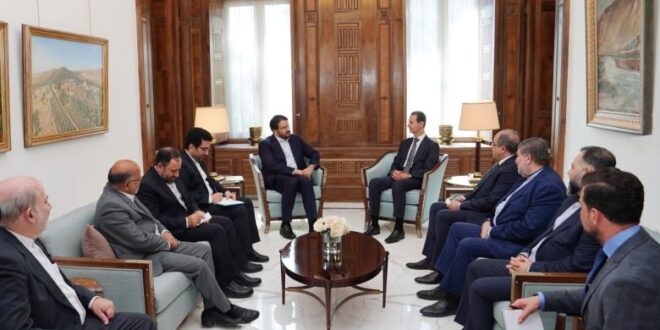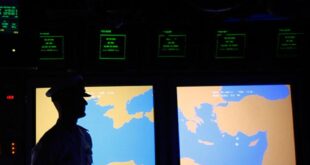Your daily brief of the English-speaking press on Syria.
The Turkish-Syrian rapprochement efforts, steered by Russia, are ranked as the second most significant game of diplomacy in the Middle East, Forbes reported.
Defence ministers and intelligence chiefs from Russia, Turkey, Syria, and Iran convened in Moscow for a crucial four-way meeting, signalling recognition of the significance of Iran’s potential to undermine agreements if sidelined.
Although various countries, such as the UAE, Jordan, Saudi Arabia, Egypt, Algeria, and Tunisia, are involved in different rapprochement attempts with Syria, the Ankara-Damascus rapprochement carries the most weight in determining Syria’s future and the influence of the US and EU on the region’s future.
However, there are several challenges and obstacles to the rapprochement, including the issue of trust, the sequencing of each party’s primary goals, and the inclusion of Iran, adding an additional layer of complexity to the negotiations.
The Kurds are caught in the crossfire of the Turkey-Assad rapprochement, putting them in a losing position, as Turkey seeks to erase Kurdish status, while other regional actors are content with Turkey addressing the Kurdish issue.
Assad-Iranian minister renew pledges for cooperation
President Bashar al-Assad on Wednesday discussed with Minister of Roads and Urban Development of the Islamic Republic of Iran Mehrdad Bazrpash the new aspects of economic cooperation between Syria and Iran and means of benefiting from the available opportunities to develop ties in domains of investment, trade and energy.
Assad was quoted by SANA as saying, “Translating depth of the political relation between Syria and Iran into a similar status in the economic domain is an essential issue, as governments in both countries have to seek best means to increase their growth.”
Minister Bazrpash, for his part, said that the Iranian President, Ebrahim Raisi, is keen on supporting the economic bilateral ties and Iran is doing its best to boost them in the interests of the two peoples.
The Minister added that the Iranian-Syrian competent committees will work on a bulk of economic titles during the next stage in the domains of investment, energy and electricity.
Iran International Website reported that Bazrpash called for expanding bilateral cooperation in banking, energy, transit, transportation, and tourism.
Utilizing ports access, Tehran and Damascus can establish shipping lines to boost exports and imports, Bazrpash said, claiming Iran is also ready to train Syrian pilots and develop the Arab country’s airports and refineries.
Although Iran has fought for a decade to save the Syrian government, it has a small share of Syria’s trade, and is losing out to financially stronger players.
Iran’s Revolutionary Guard, which usually tries to justify its involvement in the Syrian conflict, claims that trade and investment in Syria will pay off and compensate billions of dollars Tehran has spent supporting Bashar al-Assad.
The extent of Iranian military expenditures and financial aid to Syria to keep Bashar al-Assad in power is unknown but is believed to have run into billions of dollar at the expense of the Iranian people. Iranian parliament member, Heshmatollah Falahatpisheh, announced in May 2020 that the country had invested $30 billion in Syria and must recoup it.
Tunisian president appoints new ambassador to Syria – presidency
Reuters reported that Tunisia’s President Kais Saied on Thursday appointed a new ambassador to Syria, the Tunisian presidency said in a statement, the latest Arab move to end Syria’s regional isolation.
Tunisia cut off diplomatic relations with Syria nearly a decade ago to protest Assad’s crackdown on pro-democracy demonstrations in 2011 that developed into civil war in which hundreds of thousands of civilians have been killed and millions sent fleeing.
Turkey border guards shooting Syrians: HRW
Human Rights Watch on Thursday accused Turkish border guards of shooting, torturing and using excessive force against Syrians seeking to flee their war-racked country into neighbouring Turkey.
It urged Ankara to investigate border guards, hold those responsible for ‘grave human rights violations, including unlawful killings’ to account, and end ‘longstanding impunity for these abuses’.
‘Turkish border guards are indiscriminately shooting at Syrian civilians on the border as well as torturing and using excessive force against asylum seekers and migrants trying to cross,’ the New York-based rights group said in a statement.
‘Turkey’s generous hosting of large numbers of Syrians does not absolve it of its obligations to respect the rights of others seeking protection at its borders,’ HRW said.
It cited a March 11 incident in which border guards had ‘intercepted and tortured a group of eight Syrians who had attempted to cross into Turkey killing a boy and one man’ and returning the others to Syria.
‘Turkish gendarmes and armed forces in charge of border control routinely abuse and indiscriminately shoot at Syrians along the Syrian-Turkish border, with hundreds of deaths and injuries recorded in recent years,’ said HRW’s Hugh Williamson.
‘Arbitrary killings of Syrians are particularly egregious and part of a pattern of brutality by Turkish border guards that the government has failed to curb or investigate effectively.’
Clashes erupt between armed locals, government forces in Syria’s Daraa
Clashes erupted between armed locals and soldiers of the Syrian government forces in the city of Jasim in the northern countryside of Daraa, southern Syria.
A local source told North Press that armed locals shot at government soldiers based at the Culture Center in the city of Jasim.
The government soldiers responded to the shooting, and clashes lasted almost half an hour without reporting any casualties from both side, the source noted.
The source said that the reason behind the clashes was the continuous violations committed by the Military Security Branch, affiliated with the government forces, based in the Culture Center since 2018.
Since the government forces re-captured Daraa in line with the 2018 agreement, the governorate has been living in a state of security chaos, with one or two daily assassinations targeting soldiers and officers of the government forces, not to mention the spread of thefts.
President al-Assad issues law establishing the National Authority for Information Technology Services
President Bashar al-Assad issued on Thursday Law No. (7) of 2023, which stipulates establishing the (National Authority for Information Technology Services) to replace (National Authority for Network Services), SANA reported.
The new authority’s mission is in order to keep pace with the progress and development in the field of Internet and host services, support the national software industry, regulate digital signature services and the multi-tasking electronic card, and achieve information security in light of the large spread of smart applications.
The law added tasks to the new authority and granted it the exclusive right to provide information security services to public entities and supervise the fulfillment of information security requirements in the private sector.
 Eurasia Press & News
Eurasia Press & News




